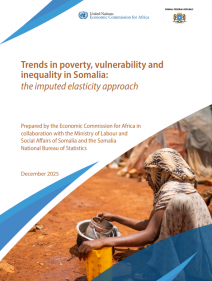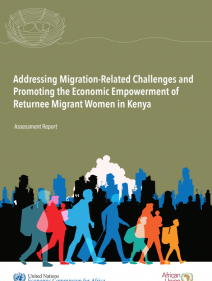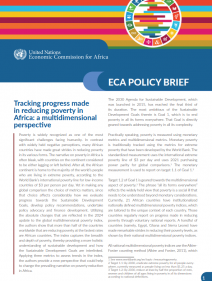
About the Gender Equality and the Empowerment of Women Section
The United Nations Economic Commission for Africa (ECA) works to advance gender equality and women’s empowerment in its 54 African Member States. At the forefront of this work is ECA’s Gender Equality and Women’s Empowerment Section, which focuses on tackling persistent gender barriers in critical sectors, such as digital finance, agriculture and trade, to drive economic growth. Leveraging ECA-wide expertise and working across sectors, the section drives transformative action on gender issues through research, technical assistance, and policy dialogue.
The section’s work is guided by ECA’s Strategic Directions and makes a tangible contribution towards achieving gender equality across Africa.
Overview: Progress on Gender Equality in Africa
Gender equality is not only a basic human right, but it is also a prerequisite for and an indication of an inclusive, peaceful, just, prosperous and sustainable world. The last three decades have witnessed tangible advances towards gender equality, including through landmark agreements such as the Beijing Declaration and Platform for Action, the Convention on the Elimination of all forms of Discrimination Against Women (CEDAW), the 2030 Agenda for Sustainable Development with a dedicated Sustainable Development Goal (SDG) 5 on gender equality and women’s empowerment as well as gender-relevant indicators in other SDGs and the African Union’s Agenda 2063. The domestication of these agreements has translated into some progress towards achieving gender equality in Africa, including:
- Significant reductions in maternal mortality;
- Increased advocacy on the elimination of violence against women; and
- Legislative, policy and programmatic efforts to fulfill women’s right to education, and constitutional and legal right to inherit.
Challenges in Achieving Gender Equality:
Despite progress in some areas, gender inequalities remain prevalent and deeply rooted in Africa. Women face ongoing human rights violations, limited access to education, healthcare, employment, decision-making, leadership, and economic resources. These obstacles are compounded by additional challenges such as infectious disease outbreaks (including the ongoing COVID-19 pandemic) and climate change, which further exacerbate existing inequalities. Additionally, violence against women remains a pervasive issue.

Our Approach
Our approach to achieving gender equality and women's empowerment and achieving the Sustainable Development Goals is to integrate SDG 5 into all development programs, recognizing that it is not a standalone goal. Our 'Gender Equality and Women's Empowerment' program addresses challenges faced by women and girls across Africa, and supports member states in their efforts to achieve gender equality and women's empowerment targets outlined in global and regional instruments. By taking a holistic approach, we strive to promote gender equality in all aspects of development.
Our team is dedicated to developing tools and knowledge products that facilitate policy design and delivery. We provide extensive support to member states in building their capacity for effective implementation, and in monitoring and evaluating progress on international agreements. Additionally, we strive to build regional consensus on gender equality priorities.
Our work is divided into three cross-cutting streams based on the commission's core functions of think tank, operational, and convening. As a team, we ensure that gender perspectives are infused across all areas of our work and we take pride in facilitating the integration of gender considerations throughout ECA’s work.
Think Tank Function
We provide cutting-edge research and analysis to assist decision-makers in member states in identifying, developing, and implementing suitable policy and program responses to gender inequalities and barriers to women's empowerment.
We carry out this mission through various flagship publications, including:
- The African Women's Report, which highlights topical challenges to gender equality and women's empowerment and recommends inclusive growth strategies.
- The African Gender and Development Index, which measures member states' progress in implementing gender equality commitments and policy options.
- The Africa Gender Index, which we jointly produce with the African Development Bank, representing the most comprehensive measurement of gender equality in African countries.
Operational Assistance
Our operational assistance focuses on helping member states implement their gender equality commitments. We tailor our efforts to each state's unique context, with a focus on sustainability. This assistance includes improvement of policy and programme design, enhancing implementation capacity and strengthening institutional development. Furthermore, we offer assistance in various ways, including:
- The application of tailored policy tools and guidelines.
- The exchange of country, regional, and global good practices.
- Research and feasibility studies, targeted capacity-building activities; and
- National reviews of international agreements' implementation.
Convening Activities
Our convening activities are a vital opportunity for representatives from governments, academia, civil society and the private sector to discuss common challenges, explore policy options, foster partnerships and build regional consensus. Our team brings together a wide variety of stakeholders to coordinate and mobilize action on regional and international agreements that require cross-border collaboration. Our convening activities serve as a vital opportunity for representatives from governments, academia, civil society, and the private sector to discuss common challenges, explore policy options, foster partnerships, and build regional consensus.
Our key events include:
- The Africa Regional Consultations on the Commission on the Status of Women.
- The statutory meeting of the Committee on Social Policy, Poverty, and Gender.
- The Africa regional review of the implementation of the Beijing Declaration and Platform for Action.
Our commitment
We are committed to supporting member states in achieving gender equality and women's empowerment, as well as delivering our mandate and programs across the Commission. This achievement will unlock significant benefits for families, societies, and economies and serve as the cornerstone for realizing all goals of the 2030 Agenda for Sustainable Development.
Statutory Meetings: Committee on Gender and Social Development
Related Links and Resources
African Women's Rights Observatory
E-network of National Gender Machineries & Mechanisms in Africa




![[Blog] Why ending child marriage is key for seizing Africa’s demographic dividend](https://uneca.org/sites/default/files/styles/tumbnail_436_x_221/public/storyimages/shutterstock_2095149139-2000x667.jpg?itok=Pk07bXxj)


